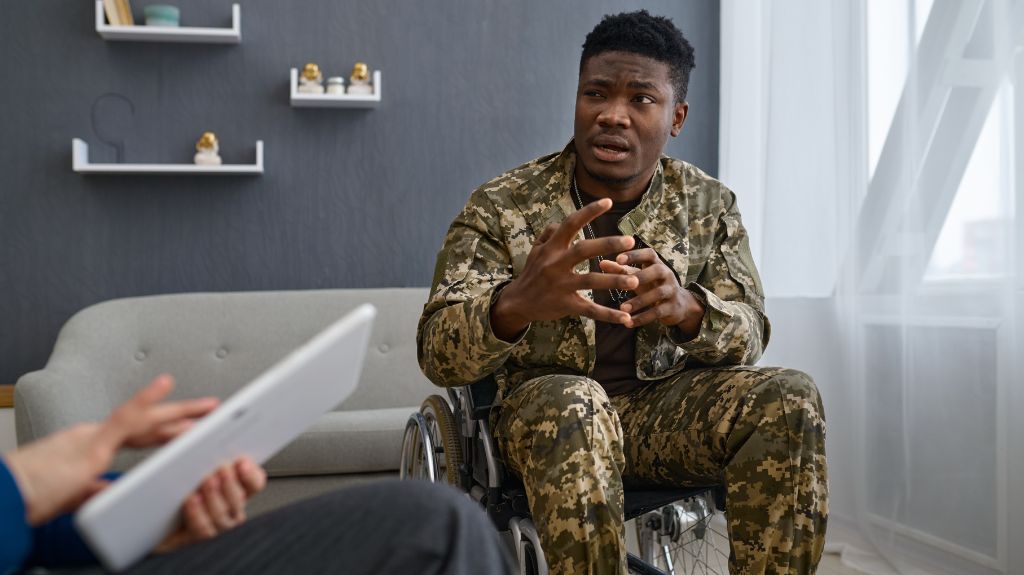How Do I Get VA Disability Benefits for Radiculopathy?
Many veterans experience the impact of radiculopathy—a debilitating condition caused by a compressed or injured nerve within your spinal column. Radiculopathy can be distressing, impeding basic tasks such as walking, sitting, and bending, often accompanied by discomfort or even pain. Such limitations can disrupt your ability to maintain employment, engage in hobbies, care for your loved ones, and nurture social connections.
Should you be ready to initiate the appeals process and attain VA disability benefits for radiculopathy, we invite you to reach out for a complimentary case evaluation. The landscape of VA procedures and regulations can be an ever-shifting terrain. Avoid the frustration of fruitless efforts—allow us to navigate the intricate appeals process on your behalf, ensuring your time and energy are not squandered.

Has Your Radiculopathy Claim Been Denied?
Living with radiculopathy means that you are dealing with pain and numbness on a daily basis. This can greatly affect your quality of life and your ability to be there for your family. However, the VA may have denied your radiculopathy claim for several reasons. Reasons radiculopathy claims get denied include:
- Insufficient service connection: The VA relies solely on the documentation you provide, lacking personal knowledge of your situation. A clear link between a service-related event and your radiculopathy is crucial. Consider supplementing your appeal with a buddy statement or testimonies from friends and family to strengthen your case.
- Incomplete information requested by the VA: Life can become overwhelming, causing delays in submitting requested information to the VA within the given timeframe. Hiring our services ensures diligent management of deadlines and tedious paperwork, while you focus on attending any necessary doctor visits.
- Incorrect form submission: The abundance of forms on the VA website can be confusing, leading to the possibility of filling out the wrong form. Don’t worry, it’s a common occurrence. Let us help you navigate through the maze of forms to ensure accurate submission.
- Lack of formal diagnosis: Radiculopathy often stems from an underlying health condition, which you may already be receiving benefits for. However, if you seek VA disability rating for radiculopathy specifically, a formal diagnosis is essential. Mere inclusion of associated symptoms in your medical records is insufficient.
Receiving news that you’re ineligible for benefits can be incredibly frustrating. However, there is a silver lining: you have the right to appeal a denial from the VA. As of February 19, 2019, there are three available avenues for appeal: the Supplemental Claim, Higher-Level Review, and Board Appeal. In case you disagree with a particular decision, you may have the opportunity to pursue an alternative review option.
If your denial predates February 19, 2019, you may still have the possibility to file an appeal or a Supplemental Claim under the updated process, provided that the necessary documents are submitted.
Determining which options you qualify for and which align best with your circumstances can be complex. That’s where we come in. We understand that obtaining your benefits promptly is crucial, and you don’t have time to spare. Let us assist you in navigating this process efficiently and effectively.
How Does Radiculopathy Happen to Veterans?
Service-related radiculopathy frequently arises or worsens due to back injuries or strains. Various activities encountered by service members can lead to back injuries, including:
- Lifting, pushing, or pulling heavy equipment
- Operating weapons
- Jumping or falling
- Exposure to explosions
- Involvement in motor vehicle accidents
These activities can contribute to the development of radiculopathy by exacerbating pre-existing spinal conditions, such as:
- Stenosis
- Herniated discs
- Specific forms of arthritis
- Bone spurs
In rare cases, radiculopathy can also be attributed to a service-connected spinal infection or tumor that exerts pressure on the nerves.
Radiculopathy and VA Ratings
The rating for a veteran’s radiculopathy in the VA depends on the specific nerves affected and their level of functioning. In general, the severity of the condition is assessed by considering the following factors:
- Paralysis: If the nerve is completely or partially paralyzed, it affects the functioning. This aspect is taken into account to determine the severity.
- Neuritis: When the nerve is swollen, painful, and irritated, but still functioning, neuritis is identified. To establish the severity of neuritis, the evaluation considers at least one of the following: decreased sensory ability, muscle atrophy, or loss of reflexes.
- Neuralgia: Neuralgia refers to constant or intermittent pain caused by the nerve, often accompanied by numbness or tingling sensations.

However, it is important to note that symptoms often overlap, which can make the assessment of paralysis, neuritis, and neuralgia complex and inconsistent.
The VA assigns a rating based on the levels of functioning and severity, considering the specific group of nerves affected. Different nerve groups are associated with distinct diagnostic codes for accurate evaluation and rating.
Getting a Service-Connection for Radiculopathy
In order to establish service-connection for radiculopathy, veterans need to provide evidence of a current medical diagnosis that connects the condition to an in-service occurrence or incident that either caused or worsened the radiculopathy.
Some examples of in-service incidents that can be linked to radiculopathy include:
- Experiencing a vertebral fracture or dislocation, or sustaining physical strain to the back during training exercises.
- Engaging in activities such as operating weapons, lifting heavy equipment, jumping, or participating in other military exercises.
It is important to note that veterans are not required to attribute their radiculopathy to a single specific incident during their active-duty service.
Secondary Service-Connection for Radiculopathy
Radiculopathy is frequently associated with underlying back conditions, making it commonly service-connected on a secondary basis. Secondary service connection is established when a veteran’s service-connected condition either causes or worsens a non-service-connected condition, leading the VA to grant service connection for the secondary condition.
Radiculopathy serves as a prime example of secondary service connection. Let’s consider an illustration: A veteran is granted service connection for degenerative disc disease in the lumbar spine. However, a few years later, they receive a diagnosis of radiculopathy in their lower extremities, which resulted from the service-connected degenerative disc disease. In this scenario, the veteran can now submit a claim to the VA for secondary service connection, as the radiculopathy was caused by their degenerative disc disease.
Common causes of radiculopathy include:
- Back strain or spinal injury
- Degenerative arthritis
- Degenerative disc disease
- Herniated discs
- Spinal stenosis
It is important to note that secondary conditions are rated using the same rating schedules as primary service-connected conditions.
Get Help from a VA Benefits Attorney Today
If you or a family member are suffering from radiculopathy and have been denied benefits, or need to know next steps, get in touch with us today. We can discuss your case and help you on your way to VA benefits.
